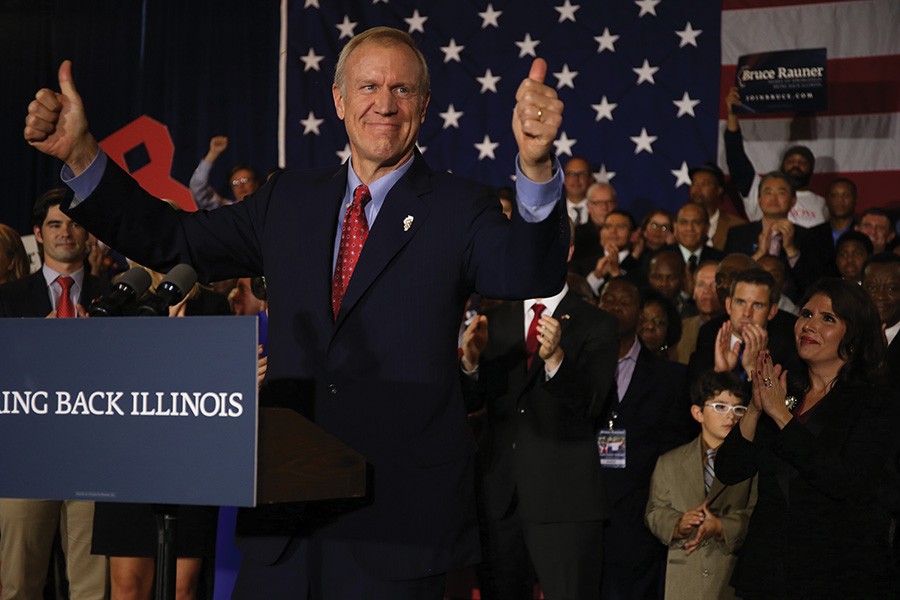Rauner’s consideration of right-to-work laws unlikely to impact Evanston
Source: Brian Cassella, Chicago Tribune/MCT
Republican candidate for governor Bruce Rauner declares victory at Rauner's election night celebration at the Hilton Chicago 2014, Tuesday, Nov. 4, 2014 in Chicago.
March 1, 2016
Despite Gov. Bruce Rauner’s discussion of exploring right-to-work legislation to settle Illinois’ budget crisis, the laws would be unlikely to impact Evanston if implemented, city manager Wally Bobkiewicz said.
The governor proposed right-to-work laws as a possible compromise to the state budget stalemate in his Jan. 27 State of the State address. Right-to-work laws remove bargaining rights from unions and ensure that employees are not obligated to join unions or pay union dues in any workplace. Both state Democrats and local union workers have criticized the legislation.
Rauner said he would consider those laws as cost-cutting “structural changes” the legislature could pass for him to approve the budget put forth by state Democrats if they remain unwilling to cut $4 billion from their suggested $36 billion budget per his recommendation.
“I’m insisting that we attack the root causes of our dismal economic performance,” Rauner said in the budget address. “I understand that union leaders and trial lawyers are putting pressure on you to keep the status quo, but if we don’t offer a competitive environment for businesses, pretty soon the unions won’t have any more jobs to unionize and the trial lawyers won’t have any more businesses to sue.”
When Rauner introduced his version of the legislation to the Illinois House last May, it failed, yielding zero yes votes. However, governors in neighboring states such as Wisconsin, Indiana and Michigan have all passed right-to-work laws in the past five years.
If right-to-work laws were to pass in Illinois, they would most likely be on a county or municipality-level, Bobkiewicz said, and Evanston is not likely to be a community to implement them. Bobkiewicz said given the “long history” of union membership in the city, he thought it was unlikely City Council or the Evanston community would have any substantial discussion on the matter.
However, now is an important time for unions in the city, as Evanston employee’s contracts will be negotiated over the summer since current contracts end Dec. 31.
“Over the next few months, not having a budget and ongoing right-to-work discussions would certainly make creating long-term agreements more difficult,” Bobkiewicz said. “We’re just keeping a close eye on what’s happening in Springfield, and when we find ourselves back at the bargaining table, we’ll see what the world looks like.”
It is unlikely, however, current Illinois legislators will pass right-to-work laws, said Anders Lindall, spokesman for the Illinois branch of the American Federation of State, County and Municipal Employees, a national government employee union.
AFSCME represents over 100,000 public employees throughout Illinois, including Evanston employees. He said Illinois voters and lawmakers made it clear where they stood on right-to-work issues, and the budget crisis and unionization are two very separate issues Rauner tried to conflate.
“There’s no question that schemes like this to drive down wages and hurt working families are exactly the kind of extreme agenda that Governor Rauner backs,” Lindall said. “It’s not an issue now, but if he is able to buy enough influence in the general assembly in elections this fall or in two years from now, it could be a real threat.”
For Illinois residents to avoid the implementation of right-to-work, Lindall said it was important to keep Democrats in the majority in the general assembly for years to come.
“People with more money are taking evermore for themselves at the expense of working folks,” Lindall said.“The way for working people to come together is through voting and through their unions, to counterbalance that increasingly out-of-whack economic system.”
Rauner addressed critics of suggested budget-reducing legislation — such as right-to-work — in his January address, saying the legislation was a way to keep jobs in the state, along with efforts including tax cuts and government consolidation.
“All I’m asking for is a return to balance in this state — ’cause right now, we don’t have competitive balance and jobs are leaving,” Rauner said.
Email: [email protected]
Twitter: @robinlopsahl


